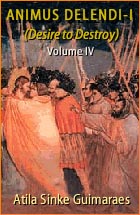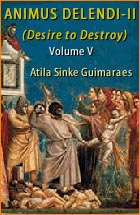Consequences of Vatican II
 |
 |
 |
 |
 |
 |
 |
Francis, the Popular Movements and
The Hammer & Sickle
On July 9, 2015 at the Second World Meeting of Popular Movements in Santa Cruz de la Sierra in Bolivia, Pope Francis delivered a long and impassioned speech against capitalism and private property to the applause of Marxist revolutionary leaders and followers of Liberation Theology.
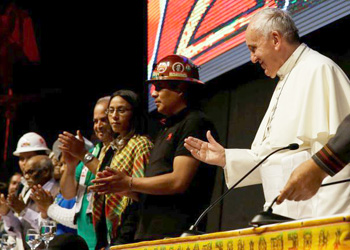 Among those leaders, in addition to Bolivia’s President Evo Morales, whose jacket bore a large picture of bloody-thirsty "Che" Guevara, were Brazilian Juan Pedro Stedile, leader of the Landless Workers Movement (MST) that has promoted revolutionary violence for decades in the Brazilian countryside, and Argentine Trotskytist Juan Grabois, a specialist in promoting urban agitation on the outskirts of Buenos Aires, head of the Confederation of Popular Economy and a member of the organizing committee of the Second World Meeting of Popular Movements.
Among those leaders, in addition to Bolivia’s President Evo Morales, whose jacket bore a large picture of bloody-thirsty "Che" Guevara, were Brazilian Juan Pedro Stedile, leader of the Landless Workers Movement (MST) that has promoted revolutionary violence for decades in the Brazilian countryside, and Argentine Trotskytist Juan Grabois, a specialist in promoting urban agitation on the outskirts of Buenos Aires, head of the Confederation of Popular Economy and a member of the organizing committee of the Second World Meeting of Popular Movements.
Along with other delegates present, these people rank among the worst Latin American revolutionary leaders that remain from the times of Communism. Yet, Francis treated them as if they were the very best of the best, asserting that their actions were "motivated by brotherly love," promoting "positive change" in society and representing the genuine work of “social poets.”
Francis encouraged them on, saying, “Our faith is revolutionary," adding, “I have carried you in my heart." Francis’ support of these revolutionary shock troops could not have been greater.
“Chavez died and Fidel is sick. Francis has taken up that leadership role and is doing everything right,” boasted Juan Pedro Stedile of Brazil’s Landless Workers Movement (MST), one of the organizers of the Second World Meeting of Popular Movements, speaking during the event at Santa Cruz de la Sierra (cf. Fabiano Maisonnave, special envoy to Bolivia, in Folha de S. Paulo, July 8, 2015).
Francis emphasizes his revolution in ecology
In a fiery speech, Francis placed the goals of their socio-economic revolution together with those of his own ecological revolution, giving primacy to the latter, “perhaps the most important thing we should take up today.”
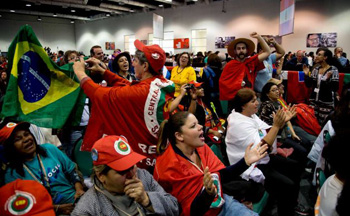 This papal speech and the recent encyclical letter Laudato Si suffer, however, from a significant and worrisome scientific “gap,” which, with all due respect, affects a fundamental premise of both documents. This is the thesis defended by the most extreme environmentalists and fully assumed by Francis, that human activity - and not natural cycles - are the main culprits for current climate changes. This thesis is not unanimously supported in the most respected scientific circles and has been challenged by high-level academic studies.
This papal speech and the recent encyclical letter Laudato Si suffer, however, from a significant and worrisome scientific “gap,” which, with all due respect, affects a fundamental premise of both documents. This is the thesis defended by the most extreme environmentalists and fully assumed by Francis, that human activity - and not natural cycles - are the main culprits for current climate changes. This thesis is not unanimously supported in the most respected scientific circles and has been challenged by high-level academic studies.
No one knows what specific scientific studies and ecological specialists the Pontiff based himself on, because the bibliography in both texts cites no document in this regard. It is also important to recall that on April 27 of this year, 100 environmental scientists sent Francis a letter imploring him not to allow himself to be misled by the arguments of radical environmentalists and by analyses that have not been demonstrated by environmental science.
The letter added that, under the pretext of helping the poor, revolutionary environmentalists are actually contributing with their proposals to increase misery around the world (cf. Highlight International, “Francisco, aventura ecológica y ‘laguna’ científica,” June 22, 2015, ).
The same revolutionary leaders had already received the same words of praise from Pope Francis when the First World Meeting of Popular Movements was held at the Vatican in October 2014. For those revolutionary leaders of Marxist inspiration, that was, so to speak, a kind of media-op “beatification” still in this life, becoming one-of-a-kind “blessed” of an “upside down church” actually opposed to the Catholic social doctrine taught by Francis’ predecessors (cf. International Highlight: "Francisco, Publicity 'Beatification' of Revolutionaries, and ‘Social Storm’, November 2, 2014, and Nelson Ramos Barreto, "World Meeting of Popular Movements at the Vatican," Nov. 12, 2014).
In his speech in Santa Cruz de la Sierra, Francis acknowledged that "neither the Pope nor the Church has a monopoly on the interpretation of social reality."
It is impossible to understand how Pope Francis surrounds himself with revolutionary leaders, takes up their ideas as good, and gives them virtually unconditional support without first listening to the arguments of renowned specialists who contend, with concrete data, that private property, free enterprise and the principle of subsidiarity have been a source of social progress and poverty reduction around the world despite deficiencies that should be corrected.
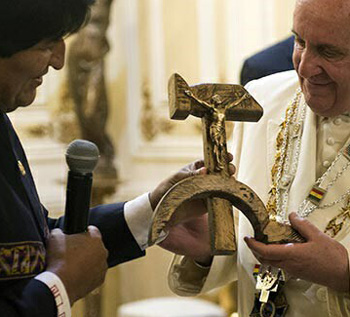 Socialism, on the contrary, has been and continues to be (as in communist Cuba and Venezuela) an economic system that intrinsically produces poverty, class struggle and social conflict.
Socialism, on the contrary, has been and continues to be (as in communist Cuba and Venezuela) an economic system that intrinsically produces poverty, class struggle and social conflict.
Accordingly, a few hours earlier in La Paz, President Evo Morales gave Francis, along with the Andean Condor decoration, the Luis Espinal Award in memory of a revolutionary priest murdered in 1970. This medal contains a blasphemous depiction of Jesus Christ on a hammer and sickle, symbols of Communism. Francis was also given a replica of the original wood carved crucifix made by the revolutionary priest.
This blasphemous medal appears to be a symbolic tragic foreshadowing of the direction being taken by Francis’ pontificate in the political and social spheres. ACI Catholic news agency reported that Francis decided to have both awards placed at the feet of the statue of Our Lady of Copacabana, Patroness of Bolivia. To him, these awards are "symbols of affection and closeness" and he received them from President Evo Morales with "cordial and generous affection" (cf. ACI, July 10, 2015).
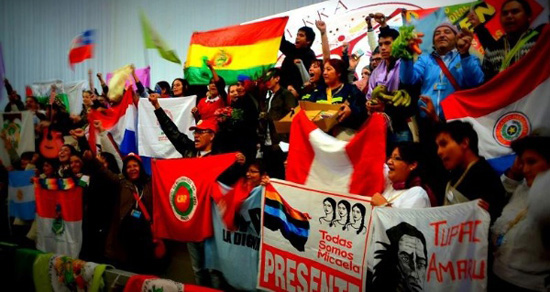

Javier González first published this article in Spanish at
Apuntes de Destaque Internacional on July 12, 2015.
Readers can contact him at: destaque2016@gmail

Pope Bergoglio speaks at the meeting of communist movements he convoked
Along with other delegates present, these people rank among the worst Latin American revolutionary leaders that remain from the times of Communism. Yet, Francis treated them as if they were the very best of the best, asserting that their actions were "motivated by brotherly love," promoting "positive change" in society and representing the genuine work of “social poets.”
Francis encouraged them on, saying, “Our faith is revolutionary," adding, “I have carried you in my heart." Francis’ support of these revolutionary shock troops could not have been greater.
“Chavez died and Fidel is sick. Francis has taken up that leadership role and is doing everything right,” boasted Juan Pedro Stedile of Brazil’s Landless Workers Movement (MST), one of the organizers of the Second World Meeting of Popular Movements, speaking during the event at Santa Cruz de la Sierra (cf. Fabiano Maisonnave, special envoy to Bolivia, in Folha de S. Paulo, July 8, 2015).
Francis emphasizes his revolution in ecology
In a fiery speech, Francis placed the goals of their socio-economic revolution together with those of his own ecological revolution, giving primacy to the latter, “perhaps the most important thing we should take up today.”

Particpants from over 40 countries wildly applaud their new Marxist leader Francis
No one knows what specific scientific studies and ecological specialists the Pontiff based himself on, because the bibliography in both texts cites no document in this regard. It is also important to recall that on April 27 of this year, 100 environmental scientists sent Francis a letter imploring him not to allow himself to be misled by the arguments of radical environmentalists and by analyses that have not been demonstrated by environmental science.
The letter added that, under the pretext of helping the poor, revolutionary environmentalists are actually contributing with their proposals to increase misery around the world (cf. Highlight International, “Francisco, aventura ecológica y ‘laguna’ científica,” June 22, 2015, ).
The same revolutionary leaders had already received the same words of praise from Pope Francis when the First World Meeting of Popular Movements was held at the Vatican in October 2014. For those revolutionary leaders of Marxist inspiration, that was, so to speak, a kind of media-op “beatification” still in this life, becoming one-of-a-kind “blessed” of an “upside down church” actually opposed to the Catholic social doctrine taught by Francis’ predecessors (cf. International Highlight: "Francisco, Publicity 'Beatification' of Revolutionaries, and ‘Social Storm’, November 2, 2014, and Nelson Ramos Barreto, "World Meeting of Popular Movements at the Vatican," Nov. 12, 2014).
In his speech in Santa Cruz de la Sierra, Francis acknowledged that "neither the Pope nor the Church has a monopoly on the interpretation of social reality."
It is impossible to understand how Pope Francis surrounds himself with revolutionary leaders, takes up their ideas as good, and gives them virtually unconditional support without first listening to the arguments of renowned specialists who contend, with concrete data, that private property, free enterprise and the principle of subsidiarity have been a source of social progress and poverty reduction around the world despite deficiencies that should be corrected.

Evo Morales presents Francis
with a hammer & sickle crucifix
Accordingly, a few hours earlier in La Paz, President Evo Morales gave Francis, along with the Andean Condor decoration, the Luis Espinal Award in memory of a revolutionary priest murdered in 1970. This medal contains a blasphemous depiction of Jesus Christ on a hammer and sickle, symbols of Communism. Francis was also given a replica of the original wood carved crucifix made by the revolutionary priest.
This blasphemous medal appears to be a symbolic tragic foreshadowing of the direction being taken by Francis’ pontificate in the political and social spheres. ACI Catholic news agency reported that Francis decided to have both awards placed at the feet of the statue of Our Lady of Copacabana, Patroness of Bolivia. To him, these awards are "symbols of affection and closeness" and he received them from President Evo Morales with "cordial and generous affection" (cf. ACI, July 10, 2015).

Representatives of communist movements from around the world welcome Francis
at the Second World Meeting of Popular Movements in Santa Cruz, Bolivia

Posted July 15, 2015
Apuntes de Destaque Internacional on July 12, 2015.
Readers can contact him at: destaque2016@gmail






